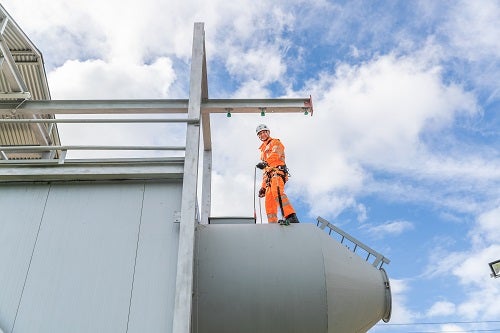What training does a wind turbine technician require?
The Global Wind Workforce Outlook 2022 – 2026, published by the Global Wind Organisation (GWO) and GWEC, predicts that there will be a huge job growth over the next four years for wind turbine technicians. In fact – it has one of the highest growth rates in jobs in the UK, and the report states that 569,000 wind turbine technicians to build and maintain the planned growth for both onshore and offshore wind turbines by 2026.
In this article we identify what GWO training is – and what training a wind turbine technician requires to work onshore and/or offshore in the UK.
To work on a wind turbine, you must have competed and passed the Global Wind Organisation (GWO) Basic Safety Training (BST).
According to the Global Wind Workforce report, there are currently just 119,000 wind technicians that hold an industry standard GWO BST certificate and thus a further 450,000 technicians will need to complete this training over the next five years.
Wind turbine technicians always work in teams of at least two, so if something goes wrong there is another person on hand to help. That’s why part of the BST training includes rescue skills.
Learn more about starting a wind turbine technician career.

What is GWO training?
The GWO sets the international standard for safety training and emergency procedures in the global wind industry. The Onshore GWO BST qualification comprises of four modules and takes 5 days to complete. Or you can complete each part of the training separately.
All aspects of the training include lots of practical exercises and scenarios and at MRS Training & Rescue training centres in Cowdenbeath, Fife and Rhondda Cynon Taff, South Wales we have specially designed mock wind turbines to replicate the conditions technicians face when working in an actual turbine.
The four modules are:
This two-day course is highly practical and covers everything you need to know to work safely on a wind turbine and rescue either yourself or a colleague from a turbine should it be required.
Technicians cannot rely on the emergency services to help as turbines are usually remote and would take too long for them to arrive. That is why part of the BST training includes rescue skills.
The working at height and rescue course covers use of the correct PPE and how to inspect and fit a harness. It also covers fall prevention (work restraint / positioning), vertical fall arrest systems, fall arrest lanyards, self-retracting lifelines (backup system) and goes through all the relevant legislation. The course includes emergency procedures in the event of an evacuation from the turbine, along with the skills and equipment needed to rescue from a turbine.
Another two-day course that is again highly practical. After learning about the relevant legislation, delegates are taught how to manage an incident and be able to give lifesaving first aid using the primary survey known as A-B-C – Airway, Breathing, Circulation. The course also includes what to do in the event of injuries to bones, muscles and joints – and if there are head or spinal injuries. As well as how to deal with major Illnesses like seizures, strokes or a diabetic emergency. Delegates take part in practical scenario-based exercises so they can experience an incident and practice how they would respond.
A half day course to ensure all wind turbine technicians understand the correct method for lifting heavy equipment both on the ground and whilst inside a wind turbine.
Delegates practice techniques inside a mock wind turbine environment making the experience as close to real life as possible, so giving them the foundations to ensure safe working practices when moving and lifting equipment and materials in a wind turbine.
This half day training course is aimed at ensuring wind turbine technicians understand how to prevent a fire occurring on a wind turbine, and how to extinguish one should it occur.
They will see and use the fire safety equipment found in a wind turbine and practise putting our fires as well as smoke detection and emergency escape procedures.
Global Wind Industry Training Records Database (WINDA)
Once all four modules have been completed and passed, delegates receive the GWO Basic Safety Training Certification for on shore wind turbines. Valid for 2 years, technicians must undertake refresher training prior to the course certification lapsing. If they do not, then the full five-day BST training must be taken again.
If technicians work on offshore wind turbines, a further module – Sea Survival – training is required to complete the offshore wind turbine BST.
To ensure potential employers can verify your certifications, they must be uploaded to the Global Wind Industry Training Records Database (WINDA). This is an online portal that holds data on all personnel who have completed a GWO qualification. You will need to register on WINDA before attending any GWO training courses and provide your WINDA registration number prior to attending the course.
In summary
Being a wind turbine technician might seem a risky job, but if you have the right training and equipment, you can enjoy a fantastic career and feel on top of the world! The sky really is the limit!





